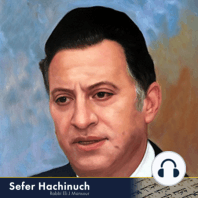20 min listen
Misva #143: Burning Leftover Sacrificial Food
FromSefer Hachinuch
ratings:
Length:
20 minutes
Released:
Feb 18, 2022
Format:
Podcast episode
Description
The Torah in Parashat Sav (Vayikra 7:17) commands that if sacrificial food was left over beyond the final time when it may be eaten, it must be burned. A separate command forbids allowing sacrificial food to remain uneaten by the deadline for its consumption. But if this food was left over, in violation of the Torah’s command, there is a Misva upon the Kohanim to burn it. The Sefer Ha’hinuch explains that the Torah commanded burning the leftover sacrificial food so that it would not be seen in its state of decay. When meat is left over, it quickly rots and emits a foul stench. In order that we maintain our esteem and respect for the hallowed food, the Torah required destroying it before it rots and becomes repulsive. Specifically, the Torah commanded burning the food, because, the Sefer Ha’hinich explains, no destruction is as complete as the destruction wrought by burning, which leaves only ashes and no actual trace of the original item. Additionally, the Sefer Ha’hinuch writes, the Torah commanded burning leftover sacrificial food in order to strengthen our Bitahon, our trust in G-d. People who limit their consumption in order to save for later do so because they fear not having enough for the future. We are to trust that G-d will always provide us with our needs, without worrying about the future. Therefore, the Torah commanded burning leftover sacrificial food to discourage hoarding, and to remind us to always trust that G-d will care for us. This obligation applies not only to Notar (sacrificial food which has passed the deadline for its consumption), but also to sacrificial food which became disqualified for consumption due to some other reason. If one is uncertain about the status of a certain portion of sacrificial food, whether or not it has become Notar or otherwise unfit for consumption, then he leaves it until its appearance changes due to rotting, and then burns it. The Sefer Ha’hinuch writes that if a person found a portion of an animal in the courtyard of the Bet Ha’mikdash, then he must assume that it is from an Ola (sacrifice which is entirely burnt on the altar). If one finds there a small piece of meat, he must assume it is from a Hatat (sin-offering, the meat of which is eaten by the Kohanim in the Temple courtyard). And if a piece of meat is found somewhere in Jerusalem, it must be assumed that it is from a Shelamim (sacrifice which may be eaten anywhere in Jerusalem). Moreover, it must be assumed that the meat has passed the deadline for its consumption. Therefore, it is left until it starts to rot, and then burned. Sacrificial food which must be burned is to be burned specifically by day, and not during the night. A Kohen who fails to burn Notar or other sacrificial meat which is no longer permissible for consumption has transgressed this affirmative command. Additionally, leaving over sacrificial food past the final time for its consumption violates a Biblical prohibition. This prohibition is not punishable by Malkut, however, because it is violated without performing an action (“Lav She’en Bo Ma’aseh”).
Released:
Feb 18, 2022
Format:
Podcast episode
Titles in the series (100)
Misva #19: The Prohibition Against Eating Hametz on Pesach: Daily Sefer Hachinuch - Brought to you by itorah.com by Sefer Hachinuch
